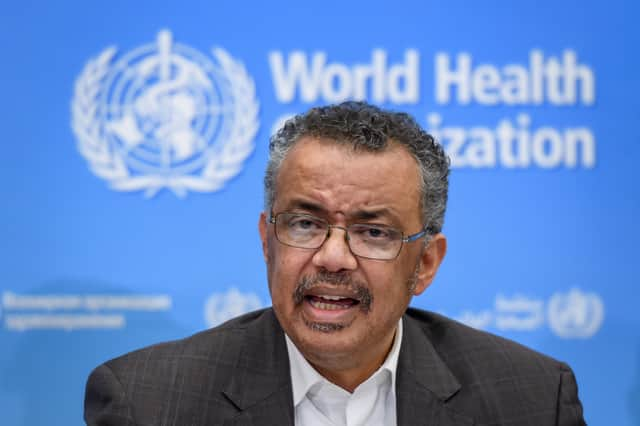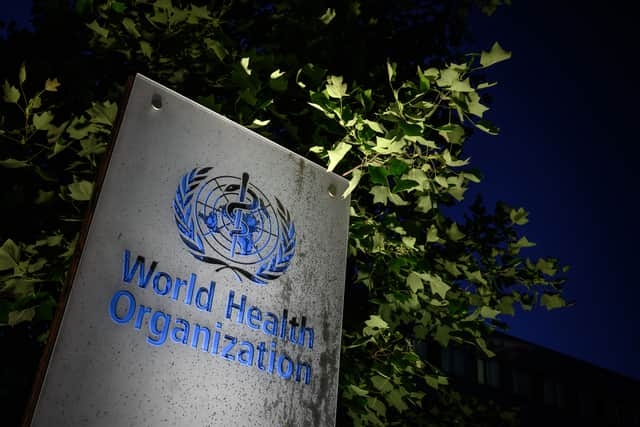Disease X news: WEF plans response against new pandemic - what is it?


The World Economic Forum is set to meet in Davos, Switzerland next week with a session named 'Preparing for Disease X' on the agenda. The meeting will address 'fresh warnings' from the World Health Organisation (WHO) that an unknown disease could kill 20 times more people than the recent coronavirus pandemic.
Director-General of the WHO Tedros Adhanom Ghebreyesus is scheduled to speak at the event, alongside Michel Demaré, chair of the board of AstraZeneca, Brazil Minister of Health Nisia Trindade Lima, and many more.
Advertisement
Hide AdAdvertisement
Hide AdThe news comes after the UK government unveiled a state-of-the-art vaccine research facility to ensure future pandemics don't have the same devestating impact as COVID-19. But what is Disease X, and why has there been backlash on social media to the upcoming meeting in Davos?
Disease X pandemic backlash
Earlier this week, right-wing social media accounts criticised the upcoming meeting for using a 'hypothetical' pandemic to impose vaccine mandates and 'restrict free speech'. Monica Crowley, former Assistant Secretary for Public Affairs for the U.S. Treasury Department during the Trump administration said a pandemic would allow for a 'new WHO treaty'.
"Just in time for the election, a new contagion to allow them to implement a new WHO treaty, lock down again, restrict free speech and destroy more freedoms." Crowley added: "When your enemies tell you what they’re planning and what they’re planning FOR, believe them. And get ready."
What is Disease X?
Disease X is a term introduced in the WHO's 2018 Global Preparedness Monitoring Board report as a way to emphasise the importance of being ready for the emergence of novel infectious diseases that could spread rapidly and have serious public health consequences.
Advertisement
Hide AdAdvertisement
Hide AdIt is used to refer to a hypothetical new disease that could potentially emerge and cause a global pandemic in the future.


It's important to note that Disease X is not a specific disease itself; rather, it's a concept that highlights the need for ongoing research, surveillance and preparedness to identify and respond to potential future pandemics.
It is essentially a placeholder name for any unidentified future pathogens that could potentially cause the next global pandemic, and is not intended to imply that a specific disease with that name will necessarily emerge.
UKHSA chief executive Dame Jenny Harries said the term is used as scientists “don’t know what the next pathogen will be that will cause a pandemic”, and the "X" in Disease X represents the unknown nature of such a disease and the need for preparedness and vigilance.
How worried should we be about Disease X?
Advertisement
Hide AdAdvertisement
Hide AdWhile Disease X is not a real disease, the concept acknowledges that despite scientific advancements and surveillance efforts, there will always be the possibility of new diseases with unpredictable characteristics emerging and spreading globally.
Professor Sir Andrew Pollard, chairman of the Joint Committee on Vaccination and Immunisation, told Sky News there will probably be future pandemics due to factors including climate change.
“Of course, it’s impossible to say exactly when that might happen, but the circumstances that we see in front of us make it very likely.
“For example, we know that climate change drives the emergence of new bacteria and viruses into our environment. And we also have urbanisation. As a result of humans moving more into animal habitats, we increase the risk of that happening.
Advertisement
Hide AdAdvertisement
Hide Ad“As we saw with Covid-19, people crowded together make spread much more likely. We’re currently at about eight billion people on the planet. And over the next 30 years or so we’re going to move to more than 10 billion.
“That does mean that, over the course of the years ahead, it becomes actually increasingly likely there’ll be further pandemics during this century.”
Comment Guidelines
National World encourages reader discussion on our stories. User feedback, insights and back-and-forth exchanges add a rich layer of context to reporting. Please review our Community Guidelines before commenting.
